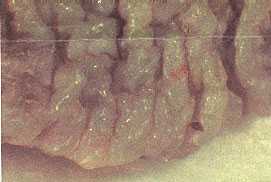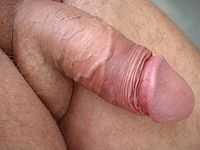Ridged band

The ridged band is a band of highly innervated wrinkly skin toward the end of the foreskin. The term ridged is used to describe the area instead of the more commonly used term "wrinkled". It has, especially in regard to phimosis (and preputioplasty), been called a preputial ring or phimotic ring. Ring being analogous to 'band', referring to the shape, and preputial meaning pertaining to the prepuce.
More particularly it refers to the "transitional area from the external to the internal surface of the prepuce," or foreskin.[1]
John R. Taylor, MB, a Canadian pathologist and medical researcher, first used the term "ridged band" instead of "wrinkly skin" and described the ridged band at the Second International Symposium on Circumcision, organized by NOCIRC (an organisation opposing infant circumcision) in San Francisco, 1991, after examining the foreskins of 22 adults obtained at autopsy.[2] The mean age was 37 years, range 22-58.[2] The prepuces were studied grossly and histologically.[2]
The term "ridged band" was subsequently used by Taylor in an anatomical and histological study of the foreskin published in the British Journal of Urology in 1996.[2] Most or all of the ridged band is removed by male circumcision.[2]
Structure

Taylor described a transversely ridged band of mucosal tissue located just inside the tip of the foreskin near the mucocutaneous boundary known as preputial sphincter. He characterized this ridged band as "intensely vascular". He described the band as "richly innervated", stated that it "contains more Meissner's corpuscles than does the smooth mucosa", and noted that these tactile corpuscles were found only in the crests of ridges.
This structure is generally part of the tissue that is removed in circumcisions.
Function


The prepuce, including the ridged band, is a specific erogenous zone.[3]
Taylor (1996) postulates that "the ridged band with its unique structure, tactile corpuscles and other nerves, is primarily sensory tissue".[2] He hypothesizes (2007) that Meissner's corpuscles in the ridged band are adapted to detect stretch:
- Work in progress indicates that retraction and stretching of this accordion-like structure triggers reflex contraction of bulbocavernosus and bulbospongiosus.[4]
Taylor theorizes that the main function of the ridged band is to trigger sexual reflexes. In a letter to the editor of BJU International, 2007, Taylor writes:
- Initial study (J.R.T. unpublished) indicates that the real importance of the ridged band to sexual intercourse lies in an ability to trigger a reflex contraction of muscles responsible for ejaculation.[5]
In the Journal of Sexual Medicine, 2007, Taylor states:
- Both glans and prepuce contribute to the single mucocutaneous junctional zone of the penis and it is possible that these apparently dissimilar structures in fact share similar functions related more to sexual reflexes than to touch perception.[4]
The effect of circumcision on sexual function is the subject of intense debate. Taylor's view is that "almost certainly, removal of the prepuce and its ridged band distorts penile reflexogenic functions but exactly how and to what extent still remains to be seen".[4] More recent research has demonstrated that the clinically important bulbocavernosus reflex is absent in 73% of circumcised men ostensibly due to the removal of fine-touch nerve endings in the ridged band.[6]
For an overview of the issues surrounding male circumcision and sexual function, see Sexual effects of circumcision.
See also
- Erogenous zone
- Foreskin
- Mucocutaneous zone
- Preputial mucosa
- Sexual effects of circumcision
References
- ↑ Sorrells, M.L.; J.L. Snyder, M.D. Reiss, C. Eden, M.F. Milos, N. Wilcox and R.S. Van Howe (May 2007). "Fine-touch pressure thresholds in the adult penis". BJU International 99 (4): 864–869. doi:10.1111/j.1464-410X.2006.06685.x. PMID 17378847.
- ↑ 2.0 2.1 2.2 2.3 2.4 2.5 Taylor, JR; Lockwood AP; Taylor AJ (February 1996). "The prepuce: Specialized mucosa of the penis and its loss to circumcision". British Journal of Urology 77 (2): 291–295. doi:10.1046/j.1464-410X.1996.85023.x. PMID 8800902. (Reprint: cirp.org)
- ↑ Winkelmann RK. The erogenous zones: their nerve supply and significance. Mayo Clin Proc 1959;34(2):39-47.
- ↑ 4.0 4.1 4.2 Taylor, John R. (September 2007). "The forgotten foreskin and its ridged band (letter)". Journal of Sexual Medicine 4 (5): 1516. doi:10.1111/j.1743-6109.2007.00588.x. PMID 17727357.
- ↑ Taylor, John R. (July 2007). "Fine-touch pressure thresholds in the adult penis (letter)". BJU International 100 (1): 218. doi:10.1111/j.1464-410X.2007.07026_4.x. PMID 17552969.
- ↑ Podnar S. Clinical elicitation of the penilo-cavernosus reflex in circumcised men. BJU Int. 2012;209:582-5. doi:10.1111/j.1464-410X.2011.10364.x. PMID 21883821.
External links
- The Ridged Band: Specialized Sexual Tissue URL: http://research.cirp.org/ (Dr John R. Taylor responsible for site content)
Illustrations
- Dr John Taylor's illustrations
- Your Anatomy Site illustrating the ridged band
- Ridged band and frenulum SexDictionary.info
Further reading
- Kristen O'Hara with Jeffrey O'Hara. Sex as Nature Intended It. Hudson, Massachusetts: Turning Point Publications, 2001: pp. 139, 148-49. (ISBN 0-9700442-0-8)
- Paul Fleiss, M.D. and Frederick Hodges, D. Phil. What Your Doctor May Not Tell You About Circumcision. New York: Warner Books, 2002: pp. 7–8, 13, 14. (ISBN 0-446-67880-5)